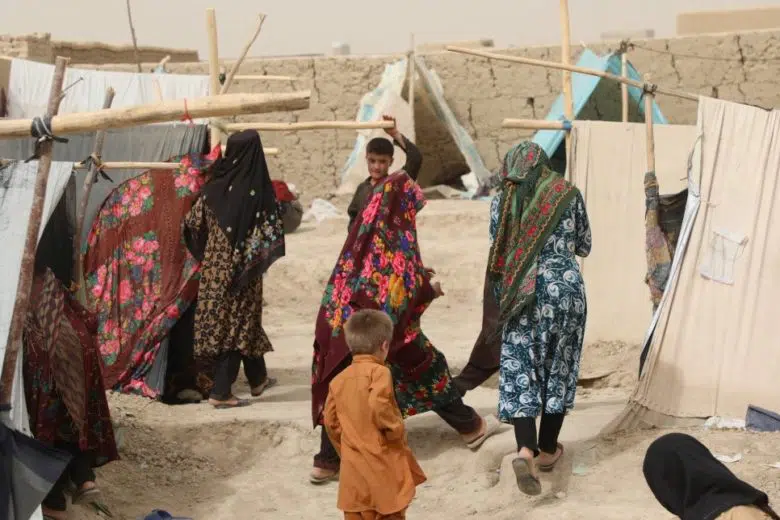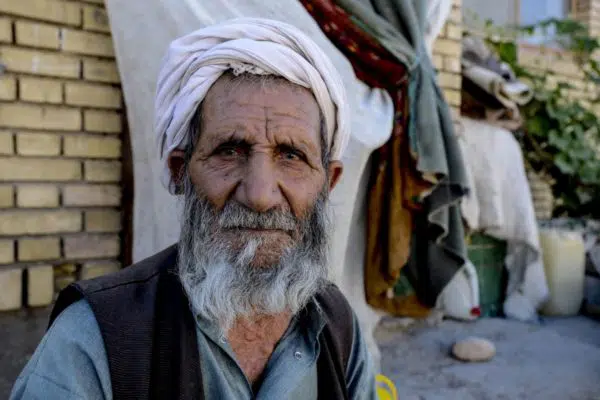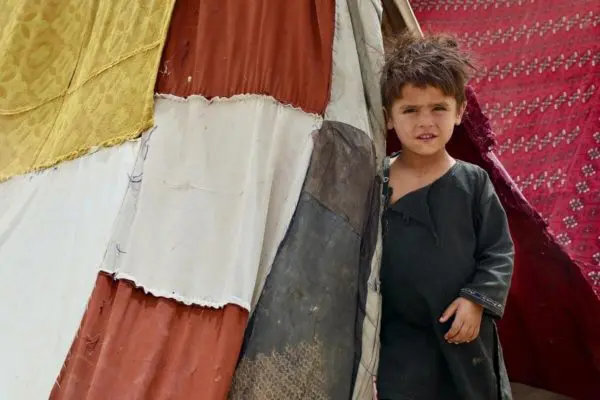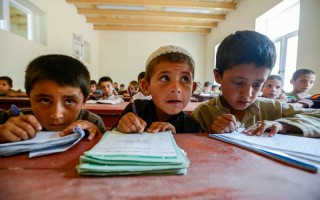
Women walk among makeshift tents in a camp for internally displaced people in Mazar-e Sharif city in northern Afghanistan. © UNHCR/Edris Lutfi
The people of Afghanistan need our support now more than ever. Our organizations are committed to helping and protecting them. We will stay in Afghanistan and we will deliver.
At the start of 2021, half the population of Afghanistan – including more than 4 million women and nearly 10 million children – already needed humanitarian assistance. One third of the population was facing crisis and emergency levels of acute food insecurity and more than half of all children under 5 years of age were malnourished.
Those needs have risen sharply because of conflict, drought and COVID-19. Since the end of May, the number of people internally displaced because of conflict and in need of immediate humanitarian aid more than doubled, reaching 550,000.
We echo the UN Secretary-General’s call for all parties (including the Taliban) to cease all violence and comply with international humanitarian law and human rights. They must allow and facilitate safe, rapid and unimpeded access for humanitarian workers – both male and female staff – so they can deliver aid to civilians in need wherever they are.
The humanitarian operation will also depend on funding, movement within, to and from Afghanistan, and access to health facilities. The critical role of front-line humanitarian organizations must be supported.
All parties must protect civilians and respect the rights and freedoms of all. Today we reiterate our commitment to promoting the rights of everyone in Afghanistan, including women and girls. Important gains made in recent years – including on gender equality and girls’ access to a quality education – must be preserved. And much more needs to be done to realize the rights of women and girls. We will continue to engage to make sure this happens. Civilians must also be allowed to seek safety and protection, including the right to seek asylum.
We call on Governments to keep borders open to receive Afghan refugees fleeing from violence and persecution and refrain from deportations. This is not the time to abandon the Afghan people. Member States must provide all possible support to Afghan nationals at risk, including a moratorium on repatriations. We urge neighbouring countries to ensure the protection of Afghans displaced across their borders.
We call on donors to remain steadfast in their support for humanitarian operations in Afghanistan and to support resilient livelihoods. The humanitarian community reached almost 8 million people in the first half of 2021 with aid. Timely funding saves lives, protects livelihoods, eases suffering and prevents further displacement. A total of US$1.3 billion is required to reach almost 16 million people with humanitarian assistance in Afghanistan; only 37 per cent of required funds have been received, leaving a shortfall of almost $800 million.
The international community has spent decades working with the people of Afghanistan to make progress. Now the international community must continue to support the people of Afghanistan if those gains are not to be reversed. Humanitarian funding must be sustained.
Now, as always, we remain committed to the people of Afghanistan and will do everything possible to stay and provide assistance, especially to the most vulnerable.
Signatories
- Mr. Sean Callahan, President and the Chief Executive Officer, Catholic Relief Services (CRS)
- Mr. Dominic MacSorley, Chief Executive Officer, Concern Worldwide
- Mr. Qu Dongyu, Director-General, Food and Agriculture Organization (FAO)
- Mr. Ignacio Packer, Executive Director, International Council of Voluntary Agencies (ICVA)
- Mr. Samuel Worthington, Chief Executive Officer, InterAction
- Mr. António Vitorino, Director General, International Organization for Migration (IOM)
- Mr. Martin Griffiths, Emergency Relief Coordinator and Under-Secretary General for Humanitarian Affairs (OCHA)
- Ms. Michelle Bachelet, High Commissioner for Human Rights (OHCHR)
- Ms. Abby Maxman, Chair, Steering Committee for Humanitarian Response (SCHR), and President and CEO, Oxfam America
- Ms. Cecilia Jimenez-Damary, Special Rapporteur on the Human Rights of Internally Displaced Persons
- Mr. Achim Steiner, Administrator, United Nations Development Programme (UNDP)
- Dr. Natalia Kanem, Executive Director, United Nations Population Fund (UNFPA)
- Mr. Filippo Grandi, High Commissioner for Refugees (UNHCR)
- Ms. Henrietta H. Fore, Executive Director, United Nations Children’s Fund (UNICEF)
- Mr. David Beasley, Executive Director, World Food Programme (WFP)
- Dr. Tedros Adhanom Ghebreyesus, Director-General, World Health Organization (WHO)
Originally published by UNHCR on 19 August 2021.





